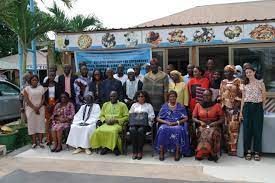By Mariatou Ngum
The National Centre for Arts and Culture (NCAC) in partnership with UNESCO Dakar office on Friday, July 22nd ended a five-day training on the Convention for Safeguarding Intangible Cultural Heritage (ICH) for Sustainable Development in The Gambia.
The workshop is part of a two-year long project funded by UNESCO under its 2003 Convention for The Gambia, entitled: ‘Strengthening National Capacities for Safeguarding of ICH’, which is in line with the ‘UNESCO 2003 Convention for the Safeguarding of ICH for Sustainable Development in The Gambia’, aimed at not only promoting cultural diversity and the destination marketing, but also contributing towards sustainable development goals 2030.
Government officials, technical stakeholders, and future Gambian trainers were being trained on the Convention for the Safeguarding of ICH with focus on the following areas: better knowledge of the 2003 Convention and methodologies for participatory community-based inventories for safeguarding ICH in The Gambia and the elaboration of safeguarding plans and measures.
Reading a statement on behalf of the Minister of Tourism and Culture, the Deputy Permanent Secretary Mr. Mamadi Dampha acknowledged the Ministry’s efforts and “several milestones” in the culture sector since 2006.
Having ratified the 2003 Convention for the Safeguarding of the ICH, he said the country inscribed ‘Kankurang’, Manding initiatory rite’ on the Representative List of the ICH of Humanity as part of a multinational nomination with Senegal. “The Gambia also participated in the project, ‘Action Plan for the Safeguarding of the Kankurang, Manding Initiatory Rite’ funded by the Japan Funds-in-Trust and implemented between 2006 and 2009; digitisation of audio-visual archives on folklore expressions and oral traditions that are archived in the Research and Documentation Division of NCAC at Fajara”.
He informed that over the past years, the country has organised cultural activities promoting some expressions of living heritage; such as the Kankurang Festival at McCarthy.
Moreover, Dampha revealed that a needs assessment on tangible cultural heritage was carried out in The Gambia in 2015 and enabled national stakeholders to address the importance of promoting local cultures and the safeguarding of intangible cultural heritage. He said the assessment pointed out the need to raise awareness and support national institutions to reinforce their knowledge on the 2003 Convention and its implementation mechanisms.
“It should also add that recent developments confirm the commitment from Gambia to enhance the implementation of the 2003 Convention at national level. In 2017, the Government of His Excellency President Adama Barrow came in place, and this increased the political will to support culture, arts and tourism, which was manifested in the increase of the NCAC annual subvention in 2018. Since 2018, Gambia has elaborated and drafted a National Arts and Cultural Policy to replace the old 1988 Culture Policy. The new cultural policy has various provisions on ICH, including on heritage assessment, capacity building, promotion of traditional management systems and harnessing of cultural heritage potential to achieve the Sustainable Development Goals,” he highlighted.
Speaking on behalf of the OIC UNESCO Multisectoral Regional Office, West Africa-Sahel, Ms HabibataThienta, the chief of Teaching and Learning Sector at the UNESCO Regional office in Dakar stated the first national ICH project in The Gambia has two main goals, first; to reinforce national capacity to better identify value in safeguarding ICH and second; to raise awareness among the party opinion in The Gambia to make Gambians proud of their heritages. Therefore, she noted that the training they are introducing aimed to tackle these two goals.
On behalf of the Director of UNESCO Dakar office, NCAC under the Ministry of Tourism and Culture, she thanked the team and participants for the great collaboration
Hon. Fafa .E. M’Bai, the chairman , Board of Directors of NCAC, in welcoming the participants he expressed hope that at the end of the training, the participants will leave the hall enriched in these and other respects by your exchanges, whether of ideas, or of experiences, or of aspirations and by your professionalism, no less friendship and camaraderie of consultation.






